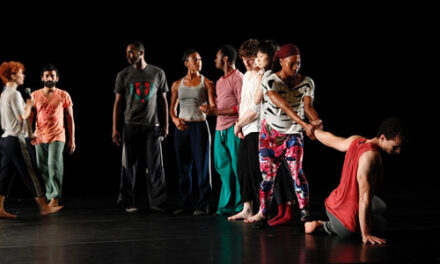One of the most anticipated musical events of the school year at UNCG is the spring opera, produced by the Opera Theatre, in which the music and theatre departments come together to create some truly magnificent work. This year was no exception. In Aycock Auditorium, Mozart’s timeless rendering of the Spanish legend Don Giovanni came to life Thursday night, under the overall direction of David Holley, and all in attendance seemed to walk away thoroughly pleased.
UNCG conducting teacher Jack Jarrett led the performance, which started off with a rousing reading of the overture – it was readily apparent that the orchestra had been well prepared. In fact, the orchestra provided some wonderful sounds throughout the performance, and I’ve come to expect nothing less. As soon as the curtain went up, I was struck by the staging. The scene was dominated by a giant staircase, and it would be the centerpiece for the whole opera. More striking was David Weigl’s portrayal of the Don’s ever suffering manservant, Leporello. His powerful voice carried very nicely throughout the hall. Scott Macleod’s Don Giovanni was delightfully sleazy as well – there was no self doubt about his character here. The Commendatore was also very well done by Amon Neely – I felt for his character after he had been shot (not stabbed, in this production) by the Don.
Donna Anna, played by Chelsea Bonagura, and Don Ottavio, sung by Jacob Wright, made for a lovely engaged couple. I must applaud Mr. Wright in particular for doing a splendid job in portraying his desire to be wed to Donna Anna and not just being a spineless foil for her. His two solo arias were sung with excellent conviction, and I felt for his suffering.
Zerlina and Masetto, sang by Caroline Oliviera and Daniel Crupi, made an excellent couple-to-be as well, but the female star of the evening was Jourdan Howell as Donna Elvira – a show stopping performance of the highest order.
The comic element in the opera was very well done, not at all taking precedence over the drama. I find this is very important in this opera, since the story does have a moral.
All of the big arias, especially Leporello’s “Madama, il catalogo,” were very well sung.
I must make mention of the costumes, which were stunning – especially for the ladies. The production was set in the mid-twentieth century; this made the story even more convincing for this is a little bit closer to us as opposed to the seventeenth century, where the story was originally set. The recitatives were done in English; this helped the performance, as some of the comedy in the opera lies in these lines, and being able better to understand what was being said made the evening seem all that much smoother. That said, the singers’ Italian diction was excellent as well.
Special praise to the onstage ensemble in the first act: these parts came through quite nicely in the party scene, and with excellent clarity.
I fully encourage seeing this presentation of Don Giovanni, which will be given tonight (March 30) and Sunday afternoon (April 1). For details, see the sidebar.











